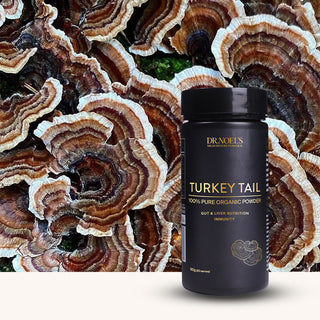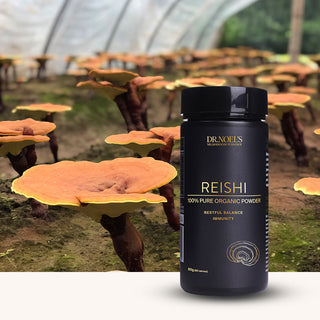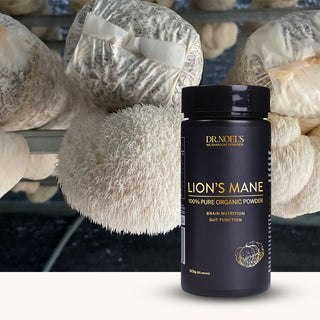If you’re one of the millions of people suffering from eczema, you may be wondering if Reishi mushrooms can help. Reishi mushrooms have been used in traditional Chinese medicine for centuries to treat a variety of ailments, and more recently, they’ve been studied for their potential benefits for skin conditions like eczema.
What Is Eczema?
Eczema is a chronic inflammatory skin condition that affects millions of people worldwide. The most common type of eczema is atopic dermatitis, which usually begins in childhood. Symptoms of eczema include dry, itchy skin, redness, and rashes. Eczema can be a debilitating condition that affects quality of life, and it can also lead to secondary infections.
It is estimated that 15-20% of children and 1-3% of adults worldwide suffer from chronic or recurrent inflammatory skin diseases like eczema.
The exact cause of eczema is unknown, but it is believed to be due to a combination of genetic and environmental factors.
Eczema tends to run in families, so it is thought that genetics may play a role in the development of this condition. Additionally, people with eczema often have other allergies or asthma. This suggests that there may be an underlying immune dysregulation that contributes to the development of eczema.
There are a variety of environmental factors that may trigger eczema flare-ups, including stress, weather changes, irritants, and certain foods.
Traditional treatments for eczema
There is no cure for eczema, but there are treatments that can help to manage the symptoms. Common treatments for eczema include topical corticosteroids, antihistamines, moisturizers, and light therapy. In severe cases, oral corticosteroids or immunosuppressants may be necessary.
While traditional treatments can be effective in managing eczema, they often come with side effects. For example, topical steroids can cause skin thinning, while immunosuppressants can increase the risk of infection. Additionally, many people with eczema find that their symptoms tend to flare up periodically despite treatment.
Reishi Mushrooms As A Natural Treatment For Eczema

If you’re looking for a natural treatment for eczema, Reishi mushrooms may be worth considering. Reishi mushrooms have anti-inflammatory and immune-boosting properties that may help to reduce eczema symptoms. Additionally, Reishi mushrooms are a source of antioxidants, which can help to protect the skin from damage.
Reishi mushroom is a type of medicinal mushroom that has been used in traditional Chinese medicine for centuries. Reishi mushrooms are now being studied for their potential health benefits, which include reducing inflammation and boosting immunity.
Reishi mushrooms can be consumed in a variety of ways, including as a powder, extract, or tea. You can also find Reishi supplements in capsule form. When consuming Rieshi mushrooms in the form of a powder or capsule, be sure choose the best quality Reishi poweder in Australia.
There is some evidence that Reishi mushrooms may help to reduce inflammation and improve immunity, both of which are important factors in eczema. In one study, Reishi extract was found to be effective in reducing inflammation in a mouse model of eczema (1). Additionally, another study found that Reishi mushroom extract was able to improve symptoms of atopic dermatitis in humans (2).
What Are The Health Benefits Of Reishi For The Skin?
Reishi mushrooms are being studied for a variety of potential health benefits, including their anti-inflammatory and immune-boosting properties. These properties may also be beneficial for the skin. In addition to eczema, Reishi mushrooms have been studied for their potential benefits in other skin conditions such as psoriasis.
Reishi mushrooms are also a source of antioxidants, which are important for healthy skin. Antioxidants help to protect the skin from damage caused by free radicals, and they can also help to reduce inflammation..
Reishi is also known for its unique bioactive compounds of beta glucans and Ganoderic acid.
Ganoderic acid
Ganoderic acid is a type of triterpene that is found in Reishi mushrooms. Ganoderic acid has been shown to have anti-inflammatory, antioxidant, and immune-boosting properties (6). This compound may be responsible for some of the potential health benefits of Reishi mushrooms.
In a Japanese study conducted on 2011, researchers evaluated the usefulness of Gandoerdma lucidum in severe atopic dermatitis (ADE). Five patients with severe ADE who were treated with Reishi mushroom at a dose of 4 to 6 tablets daily were studied. Each tablet contained Reishi extract equivalent to 0.74 grams of the dried mushroom.
Physical signs, antibody levels in the blood, and other parameters were evaluated, 3 months after the mushroom was given. Out of the 5 patients, 4 showed marked alleviation of symptoms with improved clinical parameters. This was seen in 1.5 to 3 months following treatment. The study suggested that Reshi may serve as a valuable option in the treatment of patients with severe ADE.
What are the general health benefits of Ganoderic Acid?
- Antioxidant activity: Ganoderic acid has strong antioxidant properties that can help to protect cells from damage caused by free radicals.
- Anti-inflammatory activity: Ganoderic acid can help to reduce inflammation throughout the body.
- Immune system support: Ganoderic acid can help to boost the immune system, making it easier for the body to fight off infections.

Are There Any Side Effects Of Taking Reishi?
Reishi mushrooms are generally considered safe when consumed in moderate amounts. However, some people may experience side effects such as dry mouth, throat irritation, upset stomach, and diarrhea. If you experience any of these side effects, stop taking Reishi and consult with your healthcare provider.
Reishi mushrooms may also interact with certain medications, so it’s important to consult with your healthcare provider before taking Reishi if you’re on any medications.
Can Reishi cause eczema?
There is no evidence to suggest that Reishi mushrooms can cause eczema. In fact, Reishi mushrooms may actually help to reduce eczema symptoms due to their anti-inflammatory and immune-boosting properties. However, if you experience any adverse effects after taking Reishi mushrooms, stop taking them and consult with your healthcare provider.
The Bottom Line
Reishi mushrooms are a type of mushroom that has been used for centuries in traditional Chinese medicine. Reishi mushrooms are being studied for their potential health benefits, including their ability to reduce inflammation, boost immunity, and protect against cellular damage. Additionally, Reishi mushrooms are a source of antioxidants, which can help to protect the skin from damage.
While more research is needed to fully understand the potential benefits of Reishi for eczema, the available evidence suggests that Reishi may be a helpful natural remedy for this condition. If you’re considering trying Reishi for eczema, be sure to consult with your healthcare provider first.
If you suffer from eczema, improving the quality of your sleep may help alleviate some of the inflammation associated with the eczema. Check out our article on how Reishi mushrooms may improve the quality of sleep.





